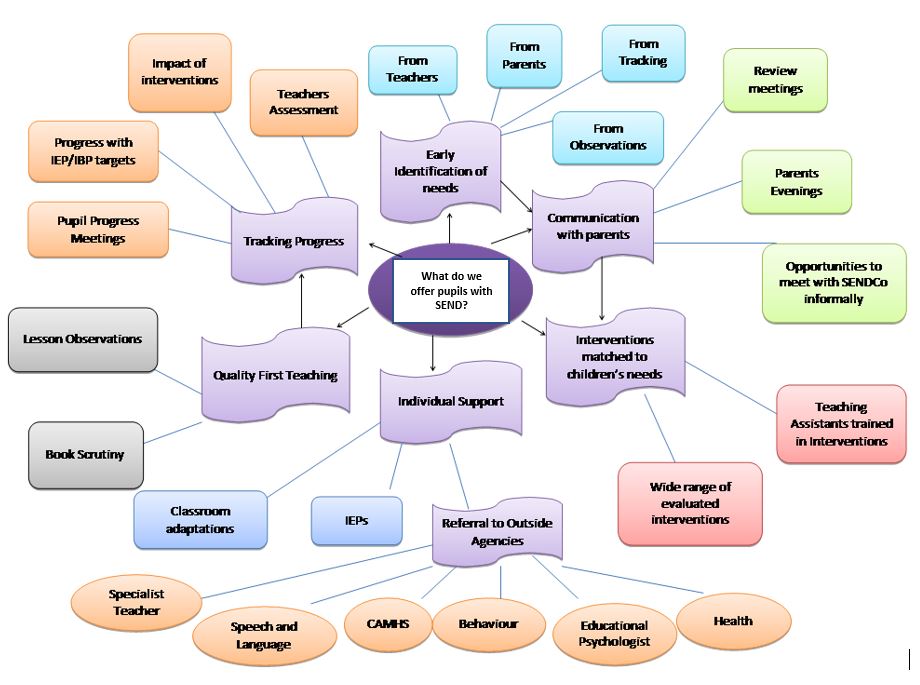Special Educational Needs and Disabilities.
At Hazel Leys Academy we aim for all pupils to become happy, confident learners so that they can progress and reach their full potential.
Every child is unique and some children may have individual needs that may affect their learning. Some children may need extra support with their learning and here at Hazel Leys we strive to provide the best nurture and support to help give children the necessary skills to catch up with other children of the same age.
Support is provided through individual and group sessions which may be delivered both in or out of the classroom. There is a dedicated team of staff who deliver targeted intervention groups and children will be monitored closely to look at progress and what special support they need. Some children will also be part of the schools Special Educational Needs (SEN) register which provides personalised targets to work on primary areas of need. The school aspires to maintain close links with parents and to provide appropriate support based upon the views of staff, parents and the child.
Our SENDCo is Miss Abbie Kamel
The Hazel Leys SEND Offer
What does Hazel Leys Academy offer children with special educational needs or disabilities?
Local Offer: Support for SEND at Northamptonshire County Council
What happens if my child has difficulty learning?
Identification of pupils with SEND and what happens when we are concerned about children's learning.
- Class teachers
- Senior Leadership Team
- Parents/carers
- Previous setting
- Liaison with outside professionals/agencies
This flow diagram shows what happens if a parent or teacher has concerns about a child’s learning. Parents are encouraged to talk to their child’s teacher or make an appointment to see the SENDCo directly.
Provision
The Hazel Leys Academy SEND offer - what can we offer children with SEND:
Universal Provision
- Quality first teaching
- TA support
- Pastoral support
- Differentiated curriculum/extension activities
- Visual timetables/individual workstations
SEND Provision
- Individual Education Plan (IEP)
- Speech and language therapy
- Autism Outreach
- Behaviour Outreach
- Educational Psychology Service
- Visual and Hearing Impairment service
- Occupational Therapy service
- Community Paediatricians
How will the curriculum be matched to my child's needs?
If your child has SEND then they may require support that is 'additional to and different' from the rest of the class. This does not necessarily mean that they will need to be taught outside the classroom. Teachers plan learning activities that are pitched at a level so that all children can access them and so that all children are appropriately challenged in order to take their learning forward. Teachers use a range of different strategies to support children in order from them to be included in the learning and activities with their peers.
Evaluating the Effectiveness of the provision for children with SEND.
- Role of the SENDCo in plan/do/review
- Arrangements for monitoring individuals progress
- Review meetings and pupil progress meetings.
- Regular assessment arrangements
- Provision Maps
- Individual education and behaviour plans
- TA training and monitoring
- Recording interventions and outcomes
- GDFT quality assurance arrangements - SEND audits and reviews
The first thing to do if you are unhappy with something at school is to speak to your child's class teacher and/or the school SENDCo. Miss Kamel is responsible for co-ordinating provision for children with SEND. If you are still unhappy you should talk to the Head of School or Executive Principal.
If you can not resolve a problem informally, ask for a copy of the academy's complaints procedure.
Your local parent partnership service (PPS) will be able to support and advise you through making a complaint. There is a PPS is every local authority, who provide confidential and impartial information, advice and support to parents and carers of children and young people with SEND.

